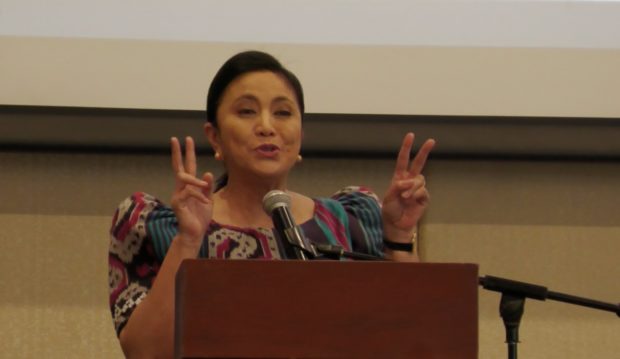
Former Vice President Leni Robredo delivers her speech as keynote speaker during the Konrad Adenauer Stiftung’s Solutions Conference on Fighting Fake News, Misinformation, and Disinformation on November 29, Tuesday in Makati City. Noy Morcoso / INQUIRER.net
MANILA, Philippines — Former vice president Leni Robredo said on Tuesday that the rampant spread of falsehoods and propaganda in the Philippines could be linked directly to the vast wealth gap in the country and the people’s anger at the democratic system for its failure to deliver on its promises.
Robredo said during the Konrad Adenauer Stiftung’s Solutions Conference on Fighting Fake News, Misinformation, and Disinformation on Tuesday that political forces took advantage of the years-long frustration of Filipinos over unfulfilled promises, channeling the people’s anger to benefit their own agenda.
She highlighted the sources of deception by quoting substantially from research on misinformation and disinformation conducted by sociology professors Jonathan Ong of the University of Massachusetts Amherst and Nicole Curato of the University of Canberra.
“If we are to come up with truly long-term solutions, then we have to understand — this is the most important — the roots of the problem. The reality for the vast majority of the Filipinos is one skewed towards the well-off, the well-connected few. The ultimate question is, so why are Filipinos so vulnerable to fake news?” Robredo said in her keynote address.
“It is one where following the rules and working hard does not guarantee the achievement of their dreams — this is what starts the frustrations. The promise of fairness and equality put forward by our democratic order has, for many gone unfulfilled. Such a situation has become deeply entrenched over the generations, yielding a deep undercurrent of frustration that was transformed into anger and set into overdrive by the purveyors of disinformation,” she added.
According to Robredo, when this anger is amplified by disinformation — just like what happened during the campaign period for the 2022 national elections — it becomes hard to start even simple conversations between persons from opposing camps.
She said that this was evident in how people branded the opposition using the color they used.
“Meaningful conversations become almost impossible. Facts, trust, and the sense that we are all in this situation together fall by the wayside.We come to view our fellow citizens as little more than adherents — to one story or its opposite; supporters of one politician or the other.So polarities are created,” she said.
“‘Even before the campaign, they have branded us based on what color we are wearing. So that is the biggest indication that polarities already exist in our society,” she added.
Experts and observers have described the campaign season for the 2022 presidential elections as polarizing, with the country split between supporters of President Ferdinand Marcos Jr., Robredo, and other candidates.
READ: Congress leaders see ‘healing’ after divisive elections
Along with this divisiveness is a very hostile social media landscape, with supporters of each camp waging word wars on comments sections despite leaders like Robredo pleading to be more gentle and inclusive in starting discussions.
READ: Robredo to supporters: Be calm, gentle and do good deeds
Robredo said that this is also part of why her camp copied Turkey’s “radical love” mindset, where she encouraged her supporters to understand that people from opposing camps are still Filipinos. However, with this failure, they changed their strategy and opted for a house-to-house campaign.
She believes that even though she lost to Marcos by a wide margin, the house-to-house campaign was a victory — in the sense that it showed how to address disinformation, which is to build damaged communication lines between people.
“If the grand strategy of disinformation actors is to stop us from talking to each other as citizens of goodwill, then the goal of the counter-disinformation agent must be to have people talk to each other again,” Robredo said.
“If disinformation wants to prevent consensus, and has eroded the spaces that allow for such consensus to be built, then we must either repair those spaces or build new ones,” she added.
After visiting the United States and Switzerland, Robredo returned home to comply with various local engagements. She will fly out of the country again later this week to attend to various invitations from academic circles.
Earlier, she revealed that the massive number of requests for her to talk in front of students and the academe comes from an interest in the Philippines’ disinformation woes.
According to Robredo, people have labeled the Philippines as a petri dish for entities who weaponize social media to their advantage. They are also curious as to how the country would solve the problem.